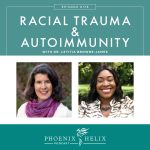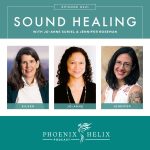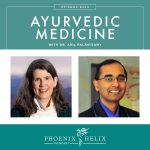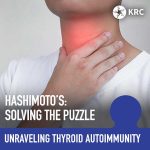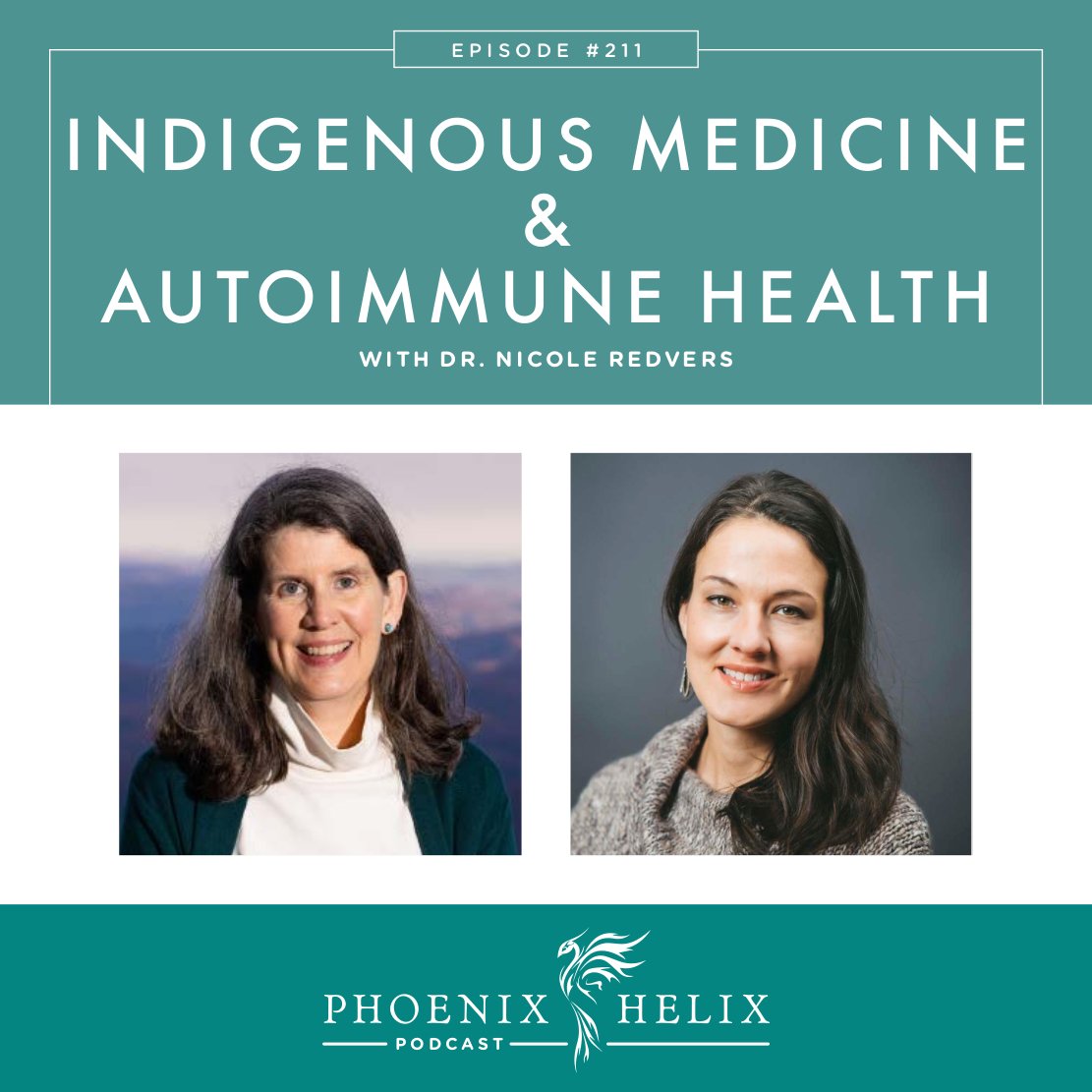
Is It the Missing Puzzle Piece in Our Health?
The modern scientific approach to medicine focuses on disease rather than wellness, it focuses on parts of the body instead of the whole, and tends to look at the patient separate from their life and the world in which they live. Traditional Indigenous medicine approaches health very differently, and that’s true for Indigenous traditions worldwide. They tend to embrace a holistic perspective, knowing that we are more than the sum of our parts, and that health is impacted by so much more than physiology. That said, modern medicine still has much to offer, but so does Indigenous medicine. Today, we’re going to focus on some of the Indigenous wisdom that might be missing from your own healthcare. My guest is Dr. Nicole Redvers, a naturopathic doctor, author, and Indigenous health scholar. She is a member of the Deninu K’ue First Nation and has traveled the globe, studying and working with Indigenous communities around the world.
Listen to the Show
- Subscribe to my podcast through your favorite podcast app: iTunes, Stitcher, Google, TuneIn, Spotify, Amazon, etc.
- You can also listen to the episode right here through the player below, and if you subscribe to my newsletter you’ll get notified of future episodes.
Podcast: Play in new window | Download
Show Notes
- Intro (0:00)
- Thank You to Our Podcast Sponsor – ShopAIP (2:50)
- Today, I’m highlighting their meat and seafood bars. When you’re on a healing diet, fast food isn’t usually an option. It’s so helpful to have healthy, satiating snacks that are light and portable to carry with you. ShopAIP has a selection of AIP-friendly bars that fill that need perfectly. Chomps grass-fed beef sticks come in two AIP-friendly flavors: Sea Salt & Italian. Wild Zora has three AIP-friendly bars: Mediterranean Lamb, Italian Beef, and Apple Pork. Epic Bar has numerous AIP flavors including Bison Bacon Cranberry, Beef Apple Bacon, Smoked Maple Salmon, and others. You can find all of these and more at ShopAIP.
- ShopAIP is an online store dedicated to the Paleo Autoimmune Protocol. With hundreds of items for the elimination phase of the AIP, and products labeled by reintroduction category as well. You can find protein bars, sauces and condiments, AIP-friendly spices, cooking and baking ingredients, waffle and pancake mix, delicious snacks, and more.
- If you’re a first-time customer, use the code PHOENIX for 10% off your order. Purchase here.
- Meet Dr. Nicole Redvers (2:05 & 4:20)
- Dr. Nicole Redvers is a naturopathic doctor, author, and Indigenous health scholar. She is a member of the Deninu K’ue First Nation and has traveled the globe, studying and working with Indigenous communities around the world. She is co-founder and chair of the Arctic Indigenous Wellness Foundation based in the Canadian North. And at the University of North Dakota, she helped co-develop the first Indigenous Health PhD degree program in North America. She’s also the author of the book, The Science of the Sacred: Bridging Global Indigenous Medicine Systems and Modern Scientific Principles.
- She grew up in a very small community in sub-arctic Canada. Like many Indigenous communities, healthcare access was poor. In addition to limited options, Western medical care didn’t include Indigenous medical wisdom. And there was a well-founded lack of trust by community members of Western institutions, including medicine. That planted the seeds of her journey to becoming a bridge between both systems of medicine. Mi’kmaw Elder, Albert Marshall, coined the term, Two-Eyed Seeing: to see from one eye with the strengths of Indigenous ways of knowing, and from the other eye with the strengths of Western ways of knowing, and learning to use both these eyes together as we seek wellbeing.
- Holism: a Major Difference Between Modern Medicine and Traditional Healing Practices (6:51)
- We have to be careful not to homogenize the multitude of diversity of Indigenous peoples and their ways of being and healing across the globe, but one thing they have in common is a holistic approach, looking at all elements of wellbeing: physical, emotional, mental, and spiritual. They’re seen as so interconnected that you cannot have wellbeing at one level if the others aren’t in balance.
- In modern Western Medicine, these elements are separated and it would be rare to have a medical appointment that synergized all these levels of healing. We all have thoughts, emotions, relationships, and communities that influence our health, yet we’re asked to ignore all those elements when addressing a physical health problem. Patients are yearning to be treated as whole human beings, and some medical practitioners have expanded to a holistic approach, but it’s not the common modern medical experience.
- For thousands of years, medical systems understood that health required a balance of physical, mental, emotional, and spiritual wellbeing. Modern medical science is the only system that doesn’t follow this principle.
- Evidence-Based vs. Evidence-Informed Medicine (9:38)
- Evidence-based medicine is the double-blind, placebo-controlled trial, considered the gold standard of modern scientific research. Its goal is to ensure that a medical treatment has a high statistical chance of success.
- Evidence-informed medicine is empirical science informed by thousands of years of real-world experience. It encompasses Indigenous medicine and other types of medicine, such as Ayurvedic and Traditional Chinese Medicine.
- Both types of medicine have value, but in Western medical care, evidence-informed medicine has been disrespected, and evidence-based medicine prioritized. The result is a wide variety of health problems that modern medicine can’t fully address. With the rise of chronic illness, it’s obvious that there is a missing piece to Western medical care, and evidence-informed medicine is likely that missing piece.
- Vibrational Level of Health (13:05)
- While there are many differences between Indigenous cultures around the world, the drum is something that’s common to most of them. They’re used in ceremony but also music and dance. It’s the sound of the universe, our heartbeat, and the rhythm of life. There’s something in our spirit and DNA that recognizes it, and when we hear and feel that vibration, it creates a deep sense of connection and wellbeing.
- Even in modern life, most people have had the experience of a piece of music moving them deeply.
- Drums, gongs, chants, and musical rhythms – when used with purpose – are foundational to health. It’s not an intellectual experience. It’s a primal one that can be both grounding and centering. And while it’s wonderful to experience this in live, communal settings, we can also gain benefits when listening to streaming music and recordings.
- One of Eileen’s favorite forms of bodywork is sound healing. It relaxes her more deeply than almost any other form.
- One note on cultural appropriation: some instruments and songs are sacred within Indigenous communities and aren’t meant to be used outside of those communities without permission. But there are many instruments and musical recordings available to everyone, and many talented Indigenous musicians and artists sharing their gifts with the world.
- Thank You to Our Podcast Sponsor – Hashimoto’s: Solving the Puzzle (18:41)
- This online course is designed by Dr. Datis Kharrazian, a world-renowned expert in thyroid health. He revolutionized the functional medicine approach to Hashimoto’s by being the first to address the autoimmune component. He’s helped thousands of patients reach remission, and this course is designed to help you achieve that same goal.
- Hashimoto’s is one of the most common autoimmune diseases, affecting 14 million people in the United States alone and millions more worldwide. Unfortunately, it takes an average of 10 years to receive a diagnosis. And many patients are never told their thyroid problem is autoimmune. While thyroid medication can help, it rarely restores health completely. This course gives you the tools to reclaim health and vitality again.
- The online video lessons are divided into 14 modules, and teach you how to:
- Order the right lab tests.
- Know which thyroid hormone medication is best for you.
- Find your unique dietary, lifestyle, chemical, and pathogen triggers.
- Customize a Hashimoto’s diet.
- And learn the best supplements to take for your unique circumstances.
- Dr. Kharrazian is offering my listeners a special discount. Save $100 with the code PHOENIX. That’s a 30% discount off the course! He also has free 1-hour webinar where you can sample his teaching style. Learn more at Drknews.com/phoenix.
- The Importance of Community in Indigenous Medicine (20:34)
- Most Indigenous communities have a collectivist culture, which means that people aren’t seen as separate from their community. If someone is experiencing a health problem, the community is often involved in treatment. Patients bring families to medical appointments, with the definition of family being very wide – it doesn’t have to be blood relatives. Then, health decisions are made as a collective group. This may startle Western doctors who are used to working with patients 1:1.
- Modern society has become more individualistic, and this is a loss. Loneliness is now a public health crisis, bringing health risks equivalent to smoking 15 cigarettes a day. Modern society has also become more divided. We’ve forgotten how to look out for each other – we are all relatives no matter who we are or where we’re from.
- If you don’t have close blood relatives, chosen family is just as valuable. Bringing even one person to a medical appointment can be helpful, especially if it’s a difficult appointment. When overwhelmed, it’s hard to process medical information. A friend or family member can listen, take notes, ask questions, and advocate if needed.
- There are many ways to seek community, including joining groups around shared interests. They not only enrich daily life, the social connection provides health benefits.
- Human Beings Are Part of Nature (25:05)
- Indigenous medicine also encompasses a connection to nature, understanding that harm to the planet harms human health. Many Indigenous peoples are environmental activists.
- One example Dr. Redvers shared is water. Human beings are 60% water, and before our drinking water arrives through the tap, it was first a river, or lake, or aquifer, or rain. We are made from those natural water sources. It’s something often forgotten in modern life. It’s another form of disconnection.
- Autoimmune disease can be a strong reminder of this connection. It brings extra sensitivity to the body, including a sensitivity to toxins. They become inflammation triggers that cannot be dismissed or ignored.
- Resources:
- Intergenerational Trauma (28:25)
- Trauma has a big impact on health, especially autoimmune health. It increases the risk of developing autoimmune disease and can also increase disease severity.
- Intergenerational trauma is inherited trauma. This is when a parent, grandparent, or great-grandparent had a traumatic experience that led to epigenetic changes that were passed down to the next generation(s). The impact isn’t just mental and emotional, but also physiological.
- The first research into this effect was in the descendants of Holocaust survivors. Research continues to grow in relation to traumas around the world, including research within Indigenous communities who have experienced vast amounts of trauma: land loss, boarding schools, forced removal of children from their homes, and genocide.
- While it’s important to understand this effect, Dr. Redvers also highlights the possibility of intergenerational healing. Positive epigenetic changes can be be inherited as well, breaking this cycle. She’s very interested in learning what can support this healing.
- Indigenous medicine approaches trauma healing very differently than Western medicine. The goal isn’t to go directly to the trauma. Instead, Indigenous healers look at the patient holistically and seek balance among the mental, emotional, spiritual, and physical elements. It’s a very individualized approach between the patient, healer, family, community, and the earth. One factor that’s almost always included though, passed on from the elders involved in the healing process, is love. Indigenous medicine believes that love is fundamental to healing – that the patient needs to feel deeply cared for, as if by their mother, grandmother, or auntie. In Western medicine, love is rarely part of a treatment approach. In fact, doctors are trained to maintain professional boundaries and keep love out of the relationship. Some doctors have broken the trust of patients by being inappropriate, so standards of ethics with very firm boundaries were created. However, something big is lost when love isn’t part of a healing approach.
- Thank You to Our Podcast Sponsor – Beth Blends (35:38)
- Before we dive into today’s conversation, it’s time to give a shoutout to our podcast sponsor: Beth Blends! They sell grain-free, paleo AIP flour mixes!
- If you’re new to the Paleo Autoimmune Protocol, or you’ve been part of this community a long time, you know that baking can be a challenge. Many ingredients that make conventional baking easy are removed during the elimination phase of the AIP.
- Beth Chen, founder of the company, knows this personally. She turned to the AIP to overcome her own health struggles. Now, her mission is to make life easier for others doing the same. After many experiments in the kitchen, she developed two flour blends that make AIP baking easy! Both flour blends are compliant with the elimination phase of the AIP and packaged in allergen-free facilities. And one of the blends is also coconut-free and cassava-free, for people with additional food sensitivities.
- Dr. Sarah Ballantyne calls them the best flour blends she has ever come across in her 10+ years leading the AIP community. That is high praise!
- In addition to the flour blends, you’ll find all the recipes you need on her website for your next special occasion, including delicious cookies, cakes, muffins, breads, pancakes, waffles, and more.
- Shop here and used the code PHOENIX for 10% off your first order.
- The Role of Elders (37:24)
- In traditional Indigenous communities, elders are highly respected and seen as carrying wisdom that can benefit all generations.
- In modern life, there is often a disconnect between generations. Elders aren’t necessarily respected, and many people don’t have intergenerational relationships, and that’s a loss for everyone.
- Friendship Benches are a program in Zimbabwe, where an elder sits on the bench, and members of the community come to get support. The goal is to help people with anxiety and depression, and it’s working. However, originally they were called “mental health benches” and no one used the service. It’s important to use language that resonates with the community being served. Dr. Redvers would love to see Friendship Benches around the world.
- In our own lives, if we don’t have intergenerational relationships, we can build them. Start with family members and neighbors. Reach out and spend time with them, and offer to help with chores that have become difficult. You can also volunteer in eldercare homes. Many elderly people are lonely and don’t get many visitors. We gain as much as we give by building these relationships.
- There are also housing programs designed to connect college students with older people. Cost of living is high, so there are financial benefits, but both lives are also enriched in other ways.
- Tying It All Together: An Indigenous Medicine Approach to Autoimmune Health (43:23)
- In modern Western medicine, most of the treatment is guided by the diagnosis and focuses on the physical body.
- In Indigenous medicine, most of the treatment will focus on the mental/emotional/spiritual levels. The diagnosis is part of the story, but not the whole story. Treatment will include many of the aspects we’ve talked about in the podcast today, and it will be individualized to each person. In Western medicine, people of the same diagnosis receive similar treatment plans. That isn’t true in Indigenous medicine.
- Spiritual ceremony is usually an essential part of Indigenous medicine. This can take many different forms, and again will be unique to each patient. Dr. Redvers shared a common ceremony for letting go: Write down the things you’ve been holding onto, that you’d like to let go. It may be related to your diagnosis, or there might be no clear connection. Then put that paper in a fire and let the smoke carry it to the spirit world, releasing that energy from your body.
- Outro (46:59)
- Dr. Redvers is active on Twitter and Facebook, which is a great way to keep up with her work. Her book is called The Science of the Sacred. You can also find her published research on PubMed.
- Eileen (your podcast host) is the author of multiple books, written to help people thrive with autoimmune disease. Learn more on the Books Page.
- If you like this podcast, follow or subscribe through your favorite podcast app. You can also subscribe to Eileen’s biweekly newsletter.
- Check out the entire archive of podcast episodes.
You May Also Be Interested In
Spreading the Word
If you like the podcast, please leave a positive review in iTunes. It would mean the world to me, and also helps others find the podcast. Here are some quick instructions using your iPhone:
- If you are already subscribed to my podcast: (1) Click the purple podcast icon. (2) At the bottom of the screen, click Library. (3) At the top of the screen, click Shows. (4) Click the Phoenix Helix podcast image. (5) Scroll down the page, and you’ll see Ratings and Reviews. Scroll down a little bit more and click on Write a Review. This will bring up the review screen. Tap 5 stars (if you love the podcast), and then click in the title box, and it will bring up the keyboard. Enter a title and short review. (6) Click Send in the upper right corner. (7) Thank you! Positive reviews give the podcast a higher search ranking in iTunes, helping people find it and letting them know it’s a quality podcast and worth their time to listen.
- If you haven’t subscribed to my podcast: (1) Click the purple podcast icon. (2) In the lower right corner, click the magnifying class. (3) Type Phoenix Helix in the search box. (4) Click the podcast cover in the Show list. (5) If you’d like to subscribe, click the + sign at the top of the screen. (6) To write a review, scroll down the page, and you’ll see Ratings and Reviews. Scroll down a little bit more and click on Write a Review. This will bring up the review screen. Tap 5 stars (if you love the podcast), and then click in the title box, and it will bring up the keyboard. Enter a title and short review. (7) Click Send in the upper right corner. (8) Thank you! Positive reviews give the podcast a higher search ranking in iTunes, helping people find it and letting them know it’s a quality podcast and worth their time to listen.

